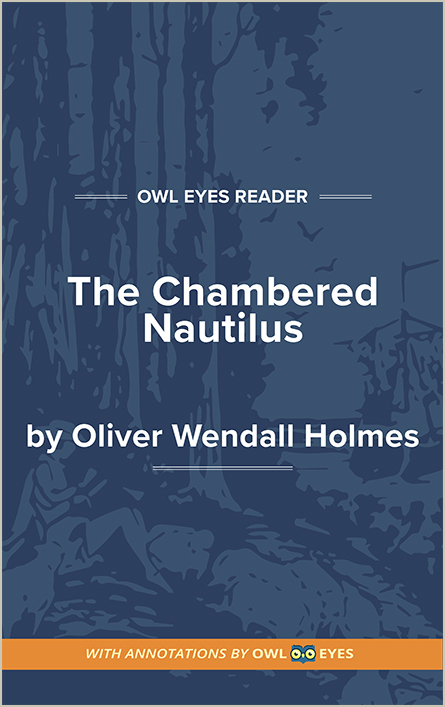Analysis Pages
Oliver Wendell Holmes Biography
Oliver Wendell Holmes was born on August 29, 1809, in Cambridge, Massachusetts, a town that had already become established as a major American cultural center by virtue of Harvard College and nearby Boston—“the hub of the solar system,” as Holmes would note only half jokingly in Essay VI of The Autocrat of the Breakfast-Table. Holmes’s father, Abiel Holmes, was a Congregational minister in Cambridge who had already established his reputation as a writer with The Annals of America (1805, 1829), generally regarded as the first attempt at an exhaustive compilation of American historical data beginning with 1492. Holmes’s mother, Sarah Wendell, was a descendant of the noted Puritan poet Anne Bradstreet; indeed, like Bradstreet, she was unusually liberal on religious issues, and her son—far from following in the devout footsteps of his clergyman father—had little patience with religious orthodoxy.
From an early age, Holmes was fascinated by natural science, and he is reported to have devoted the playtime of his childhood to analyzing the snails and insects that he found in the family’s garden, but his decision to pursue a career in medicine—which, contrary to popular belief, probably was not because of his passion for driving horse carriages at illegal speeds through the streets of Boston—would not come until much later. After a year (1824-1825) at a Calvinist preparatory school, Phillips Academy at Andover, Holmes entered nearby Harvard College and graduated in 1829 as class poet.
Still undecided as to how best to use his unusual talents, he entered Dane Law School in Cambridge and remained there for one year (1829-1830); he then enrolled at Boston’s Tremont Medical School, which he attended until 1833. This training was followed by two years of intensive study in Paris, a city that in the 1830’s was noted for its superb facilities for medical research and that attracted the brightest medical students in the United States. In 1836, Holmes received his M.D. degree from Harvard and immediately commenced his extraordinary career as a physician, research scientist, and teacher.
In 1836 and 1837, Holmes won three Boylston Prizes for his essays titled “The Nature and Treatment of Neuralgia,” “Facts and Traditions Respecting the Existence of Indigenous Intermittent Fever in New England,” and “The Utility and Importance of Direct Exploration in Medical Practice.” His 1843 essay “The Contagiousness of Puerperal Fever,” generated widespread controversy in its day, and it was not until 1861 that the Hungarian obstetrician Ignaz Philipp Semmelweis confirmed Holmes’s theory that the deadly “childbed fever” was spread by contagion—that, in fact, it was often transmitted by the midwives and physicians who attended births. Holmes also was a pioneer in the use of microscopes in scientific research, in the establishment of histology as a legitimate branch of science, and in the improvement of surgical procedures. In fact, it was Holmes who in 1846 suggested the name “anesthesia” for the physiological condition induced by Dr. William Morton in a demonstration at the Massachusetts General Hospital in October of that year.
Even at this early stage of his career, Holmes was teaching as well as doing extensive research; he was a professor of anatomy at Dartmouth College (1839- 1840), and from 1847 to 1882, he served as the Parkman Professor of Anatomy and Physiology at the Harvard Medical School. Between his teaching and research, Holmes tended not to continue his early practice as a family doctor. Part of the problem was his appearance. Boyish-looking and short (five feet four inches), Holmes found it difficult to instill confidence in his patients; more important, they apparently did not much appreciate his lighthearted manner, his sense of humor, or his reputation as—of all things—a poet.
Holmes had become famous as a poet at the age of twenty-one when, in response to a newspaper notice that the...
(The entire page is 1,153 words.)
Owl Eyes subscribers get unlimited access to our expert annotations, analyses, and study guides on your favorite texts. Master the classics for less than $5/month!

